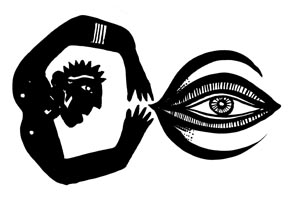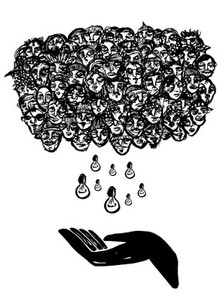 GUILHERME KRAMERFrom October 27-31, nearly 1,000 researchers holding PhDs climbed the Mantiqueira mountain range to attend the 16th Meeting of the National Association of Graduate School Programs in Philosophy (Anpof) in Campos do Jordão, São Paulo state. They participated in approximately 2,200 presentations in subject-specific sessions and in 54 working groups during the meeting, which has been held every two years since 1984. “This year, the event attracted 15% more participants than last year,” according to Marcelo Carvalho, president of Anpof and coordinator of graduate studies at the School of Philosophy, Languages and Human Sciences at the Federal University of São Paulo (EFLCH-Unifesp). The increase in the number of professors and PhDs in philosophy at the meeting reflects the growth in graduate-degree programs in the field. In 2004, there were 14 graduate-degree programs in philosophy. Today, there are 41, offering 40 master’s level and 21 doctoral programs, according to data provided by the Brazilian Federal Agency for the Support and Evaluation of Graduate Education (Capes). Currently, about 720 professors teach classes and mentor students in the graduate program. Between 2010 and 2012, around 1100 master’s theses – an average of one per day – and 350 doctoral dissertations in philosophy were defended in Brazil.
GUILHERME KRAMERFrom October 27-31, nearly 1,000 researchers holding PhDs climbed the Mantiqueira mountain range to attend the 16th Meeting of the National Association of Graduate School Programs in Philosophy (Anpof) in Campos do Jordão, São Paulo state. They participated in approximately 2,200 presentations in subject-specific sessions and in 54 working groups during the meeting, which has been held every two years since 1984. “This year, the event attracted 15% more participants than last year,” according to Marcelo Carvalho, president of Anpof and coordinator of graduate studies at the School of Philosophy, Languages and Human Sciences at the Federal University of São Paulo (EFLCH-Unifesp). The increase in the number of professors and PhDs in philosophy at the meeting reflects the growth in graduate-degree programs in the field. In 2004, there were 14 graduate-degree programs in philosophy. Today, there are 41, offering 40 master’s level and 21 doctoral programs, according to data provided by the Brazilian Federal Agency for the Support and Evaluation of Graduate Education (Capes). Currently, about 720 professors teach classes and mentor students in the graduate program. Between 2010 and 2012, around 1100 master’s theses – an average of one per day – and 350 doctoral dissertations in philosophy were defended in Brazil.
This situation is not just a result of growth in an area of research in which the first graduate-degree program, offering both master’s and doctoral degrees, was established in 1971 at the University of São Paulo (USP). The second doctoral program was not established until 1980, at the Federal University of Rio de Janeiro (UFRJ). “In the last 10 years, the community of philosophers has changed a lot, and graduate-degree programs, which had been concentrated in São Paulo, Rio de Janeiro, Minas Gerais and Rio Grande do Sul, spread throughout Brazil,” says Carvalho. Today, there is at least one graduate-degree program in philosophy in every region of Brazil. In the North, the most recent area of the country to offer diplomas in the subject, the Federal University of Pará (UFPA) launched a master’s level program in August of 2011. By the end of 2014, Capes is expected to issue an opinion on whether an additional 10 master’s or doctoral degree programs in philosophy should be created. “We are getting proposals from all over the country – from Roraima to Rio Grande do Sul,” says Vinicius Berlendis de Figueiredo, professor of philosophy at the Federal University of Paraná (UFPR) and vice-coordinator in the fields of Philosophy, Theology and Science of Religion at Capes.
 GUILHERME KRAMERRequired coursework
GUILHERME KRAMERRequired coursework
One reason for the expansion of philosophy programs is an amendment made to Article 36 of the National Education Guidelines and Framework Law (LDB). In July 2008, the President signed into law a bill making the teaching of sociology and philosophy mandatory in all high schools in Brazil, whether public or private. The law had an immediate impact on undergraduate degree programs, which produce the bachelor’s and teaching certificate degree recipients who may be interested in teaching philosophy in high school. “However, since undergraduate and graduate school programs are connected, they impact each other,” says Figueiredo. “What’s more, the growth in graduate-degree programs in philosophy had also benefitted from a broader movement to expand and decentralize graduate-level education as a whole throughout Brazil.” Held at the same time as the Anpof meeting in Campos do Jordão was the second National Meeting of High School Philosophy Teachers, an initiative that is also helping to close the gap between education and research.
The growth in graduate-degree programs has expanded the array of research options, incorporating current topics that first arose in the so-called hard sciences, alongside more traditional themes and authors in philosophy. One of the most well attended sessions at the Anpof meeting was without a doubt that given by philosopher Paulo Arantes of USP, which focused on the demonstrations that took place in the streets of Brazil in June 2013. The presentation by Décio Krause, a professor of philosophy at the Federal University of Santa Catarina (UFSC), on “Epistemological, logical and ontological concerns in the philosophy of quantum mechanics” was also well attended. The fact that some knowledge of physics was needed to understand the fine points of the presentation apparently did not discourage most of the attendees at the meeting.
Some currents in philosophy research today are meeting with resistance in academic circles. “I am a target of a lot of criticism,” says Sofia Stein, coordinator of the graduate program in philosophy at the University of Vale do Rio dos Sinos (Unisinos), in São Leopoldo, Rio Grande do Sul. “Because I don’t really work with concepts but run experiments instead, some people say I don’t ‘do’ philosophy any more. It is as if I were committing a sin, working with faulty methods and given to spreading lies. Philosophers want to be infallible. When you experiment, you make mistakes.” Her studies in philosophy having been completed almost thirty years ago, for the last four years Stein has been leading the research group Social-Brains and the Laboratory of Experimental Philosophy and Cognition Studies at Unisinos, which brings together philosophers, psychologists and neuroscientists. At the risk of oversimplifying, Stein, who has always worked in the field of philosophy of language and semantics, is now head of a group studying the philosophy of neuroscience. Her laboratory has begun designing experiments and will soon begin to work with an electroencephalogram to analyze brain activity in adults. “Research into neurological events can complement the study of semantics,” according to Stein.
Following the example of her colleague in Rio Grande do Sul, Déborah Danowski, a professor at the Pontifical University of Rio de Janeiro (Puc-Rio) has also changed the focus of her career in the last five years. A specialist in modern philosophy and metaphysics, she added an environmental component to her primary focus, specifically the issue of environmental crisis arising from imminent climate change. “I really began to pay attention to this issue when I realized that the changes in the earth’s climate predicted by scientists at the Intergovernmental Panel on Climate Change (IPCC) and other organizations would begin to be felt as soon as the next few decades,” said Danowski. “This means that a significant part of my daughter’s life, for example, will be directly affected by what we as a society are doing about this today.”
 GUILHERME KRAMERAccording to Danowski, many academics still prefer to challenge climate research, in most instances without even reading what scientists are saying. “It is as if they consider themselves immune to what is happening around them. They seem to forget, for example, that all of the great philosophers, from Plato to Hannah Arendt, were in tune with the sciences and deeply concerned with the political events of their times,” says the Puc-Rio professor. She continued, “The major political event of our times is the environmental crisis.” The researcher believes that the same concepts she used in her work on modern metaphysics are essential to the conduct of her current research. The ideas have new meaning now, involving man’s relationship to nature and other entities. In the work she is doing now, Danowski does not see any radical shift away from her earlier research in philosophy, however.
GUILHERME KRAMERAccording to Danowski, many academics still prefer to challenge climate research, in most instances without even reading what scientists are saying. “It is as if they consider themselves immune to what is happening around them. They seem to forget, for example, that all of the great philosophers, from Plato to Hannah Arendt, were in tune with the sciences and deeply concerned with the political events of their times,” says the Puc-Rio professor. She continued, “The major political event of our times is the environmental crisis.” The researcher believes that the same concepts she used in her work on modern metaphysics are essential to the conduct of her current research. The ideas have new meaning now, involving man’s relationship to nature and other entities. In the work she is doing now, Danowski does not see any radical shift away from her earlier research in philosophy, however.
Anpocs
At exactly the same time as philosophers were meeting in Campos do Jordão, the National Association of Graduate and Research Programs in Social Sciences (Anpocs) held its 38th annual meeting, in Caxambu, Minas Gerais. It was attended by around 1,200 people, 970 of whom presented at least one research project. Since 2006, the number of researchers who present papers at the meeting, which brings together academics from more than 100 graduate programs in anthropology, political science, international relations and sociology, has remained constant, at about 1,000. In the mid-2000s, the number of participants at the meeting reached a new level. In the 1990s, the Anpoc meeting attracted fewer than 500 researchers whose work had been accepted by the organization. The 500 mark was finally passed in 2003.
“Today, we deal with a wide variety of topics at the meeting,” according to anthropologist Gustavo Lins Ribeiro, from the University of Brasilia (UnB), who completed his term as president of Anpocs at the end of 2014. “In the last ten years, research in international relations has grown significantly,” he says. According to Capes data, in 2004 Brazil had only six graduate-degree programs offering both the master’s and doctorate levels in political science and international relations and 13 at the master’s level in Brazil. By 2012, there were 17 and 33 of these programs, respectively, in addition to six professional-level master’s programs.
Republish